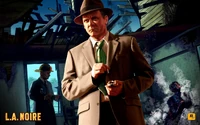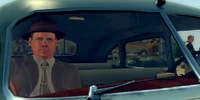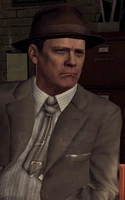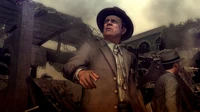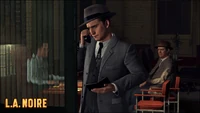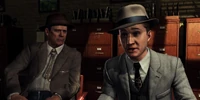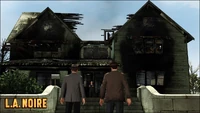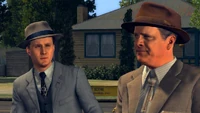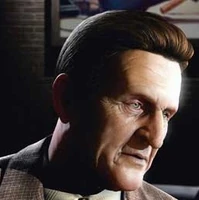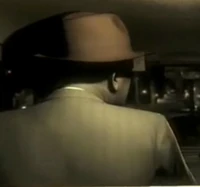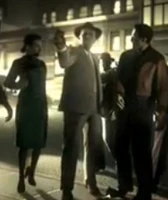
|
Spoiler Warning |
| Plot details follow, read at your own risk. |
- "There's the case that makes you and the case that breaks you."
- ―Herschel Biggs
Detective Herschel Biggs is a central character in L.A. Noire. He is Cole Phelps' final partner upon his demotion from the Vice Desk to Arson, and also acts as the narrator that accompanies the opening of the game during the Patrol Desk.
Biography[]
Background[]
Biggs was born in 1892 and grew up poor; he at one point remarks that all he wanted as a kid was food on the table. As an adult, Biggs served in the 2nd Marines and fought in World War I, where at Belleau Wood in 1918, his unit was trapped in a barn which was destroyed, presumably by German flammenwerfer troops, deeply traumatizing him.
Throughout his tenure in the LAPD, Biggs had actively refused to work with a partner, operating alone and rarely associating with any coworkers. This attitude gave him his reputation as a social recluse among fellow officers and superiors. While working arson cases, Biggs became nominally affiliated with Jack Kelso, a California Fire and Life insurance claims investigator.
Events of L.A. Noire[]
Traffic[]
Biggs and Phelps briefly crossed paths when Cole was first being welcomed to the Traffic Desk and introduced to his partner Stefan Bekowsky. Biggs shoved past Cole roughly, ignoring him as he was leaving the room. Cole asked what his problem was, to which he was jokingly told "That's Biggs. He's an institution."
Arson[]
Much later, after Phelps was demoted from Vice to Arson, Biggs was forcibly partnered with him by their Captain, Lachlan McKelty, despite his longstanding function as a lone operative. Displeased with this arrangement, he was forwardly unfriendly and reticent toward Phelps as they initially associated, and showed him very little sympathy or respect, given his affair with Elsa Lichtmann. However, despite his own dislike for Phelps, Biggs sticks up for him early on when other officers like James Hopkins verbally attack and ridicule him.
- "It's okay. His name may be dog shit, but there's none on his hand."
- ―Biggs, when a patrol officer hesitates to shake hands with Cole.
He regards Phelps as a self-aggrandizer with a hero complex, and takes pride in the fact that he has not fired a shot in anger since 1918. While investigating the Steffens and Sawyer house fires, Phelps began to suspect that the fires were connected; Biggs dismissed Phelps' lofty suspicions as desperate attempts to restore his pride and personal glory.
Despite any tension or disagreement between them, they solved the case, which ended with the arrest of Matthew Ryan. While investigating another house fire, Biggs was visibly disturbed by the sight of the remains of the Morelli family, and was deeply offended when the coroner referred to the charred remains of the family merely as "evidence," storming away from the scene. Following this, Biggs confided in Phelps his experiences at Belleau, and vowed to kill the arsonist responsible for the murder of the families.
After investigating Rancho Escondido, a housing development that had burned down, Biggs and Phelps both began to suspect a link between the arsons and Elysian Fields Development, and promptly went to question Leland Monroe. However, both Phelps and Biggs were advised not to dig into Monroe's personal affairs (once as a warning from McKelty, and once as a threat from Roy Earle), at which point both were able to settle their differences in order to close the case. From then on, the two began to get along better, work more cooperatively, and trust one another.
They found out that known pyromaniac Herbert Chapman had been working as a waybill for Elysian Fields, handing out the promotional pamphlets to the areas with the house fires. Phelps had serious doubts about Chapman and Monroe working together, seeing as the fires always seemed to benefit Elysian in some way. Herschel agreed, but said that the evidence was better for Chapman. Unfortunately, Phelps and Biggs' investigation came to an abrupt halt, due to the corrupt influence of Monroe. However, thanks to Jack Kelso's own efforts, the three discovered the conspiracy behind the Suburban Redevelopment Fund.
Biggs and Phelps witnessed the Nicholson Electroplating Plant explosion from a safe distance. Their investigation of the explosion ultimately uncovered the criminal deeds of retired Vice Detective Vernon Mapes and ended with a shootout. McKelty praised both Biggs and Phelps for not only solving the case, but also for putting an end to the notoriously corrupt ex-cop.
- "There's a time to talk, and a time to shut up. Now is the time to be quiet, son."
- ―Biggs, to the patrolman who tried to intervene during the confrontation between Phelps and Earle.
After discovering the dead body of Courtney Sheldon, Biggs stood back as Phelps viciously confronted Roy Earle after he slandered his deceased comrade, and Biggs developed even greater respect for Phelps for standing against him. The two then moved on to investigate the murder of Dr. Harlan Fontaine. Within his office, they discovered that the SRF's true goal was extortion not by insurance, but through eminent domain. They quickly realized that the SRF put millions of dollars into circulation, adding that the properties' real value was next to nothing, in addition to the fact that a false higher claim would eventually be declared by California Fire and Life. Herschel didn't know how they would be able to prove any of it, due to Fontaine's murder and the fact that Monroe had nearly bled to death following Jack Kelso's attack on him; he did, however, believe that Kelso would be their next target, and that they would have to act quickly.
Ending[]
Biggs and Phelps arrived to Jack's aid in order to save Elsa and apprehend the true arsonist. They were able to defend Jack from corrupt police chief William Worrell and arrived at the tunnel entrances. Phelps and Kelso entered the tunnel system while Biggs secured their exit. After pulling Kelso and Elsa safely out of the tunnel, Biggs and the others were too late to save Cole, who simply uttered a final goodbye before being killed by a violent oncoming torrent of water.
Biggs attended Cole's funeral, which during the eulogy given by Earle, Elsa stormed out visibly upset, prompting him to go after her to console her. As he left, Herschel briefly spoke with Kelso, and the two came to an understanding regarding the latter's complex relationship with Cole; both hoped that he knew, while they weren't friends, they were ultimately allies in their shared objective of justice.
Personality[]
Biggs is initially described as a "social basket case," mainly because of his reclusive tendencies and solitary style of work, hence he is generally disregarded or treated like an outsider by fellow members of the LAPD. Before growing accustomed to Phelps, the only people he seems remotely friendly with are Malcolm Carruthers and Albert Lynch, although these relationships are mostly based on mandatory association, professional respect and shared dedication rather than any personal affection. Despite his initially standoffish attitude, Herschel is swiftly shown to have a strong sense of morality, and to be a deeply empathetic person.
Biggs had a difficult life, from his poor upbringing to his experiences during the first World War, subsequently causing him personal and emotional problems. After losing multiple friends and comrades in combat, he likely avoids becoming close to any other people, like his coworkers for instance, in an attempt to maintain personal peace of mind, a subconscious defense mechanism sometimes seen in traumatized veterans. Another potential reason for his effort to distance himself from the rest of the force would be in order to avoid corruption and remain politically nonpartisan.
Biggs is an experienced and proficient detective. He is widely adept and knowledgeable in investigating arson, and mostly committed to his work. Biggs' partnership with Phelps helps him evolve both as a person and as a detective, giving him the will to stand up and fight corruption. While initially having no respect for Cole during their early partnership, he grows to respect Cole's dedication to true justice and the law, despite Cole's scandal. He becomes one of Cole's only true friends by the end of the campaign, and is deeply saddened by his death.
Vehicle[]
Biggs owns a two-tone green Hudson Commodore which, if going by the game's setting of 1947, is brand new. Biggs presumably bought the car himself and had it instated as his police service vehicle.
Case Appearances[]
Main Story[]
Patrol[]
- "Upon Reflection" (Voice)
- "Armed and Dangerous" (Voice)
- "Warrants Outstanding" (Voice)
- "Buyer Beware" (Voice)
Traffic[]
Arson[]
Street Crimes (Arson)[]
Trivia[]
- At 55, Herschel is the oldest partner that Phelps gets to work with, and is even older than his superior officer, Captain Lachlan McKelty.
- Herschel smokes cigarettes very frequently.
- Herschel's badge number is 525, as revealed in "Nicholson Electroplating."
- He is the only partner to not appear in every case related to their department; he does not appear in "House of Sticks" and "A Polite Invitation," the two cases played solely as Jack Kelso.
- In "The Gas Man," he tells Cole that he had never fired his weapon in the line of duty until he and Phelps became partners.
- Biggs was the first partner unveiled in the earliest L.A Noire trailer, although portrayed by or based off of a different actor.
- Biggs' jacket has black smudges, like ash, on the sleeves and bottom hem; quite fitting, as he is an arson detective.
- Biggs' voice sounds similar to that of Edgar Buchanan, a famous television actor who was active in the era the game takes place.
Gallery[]
| |||||

